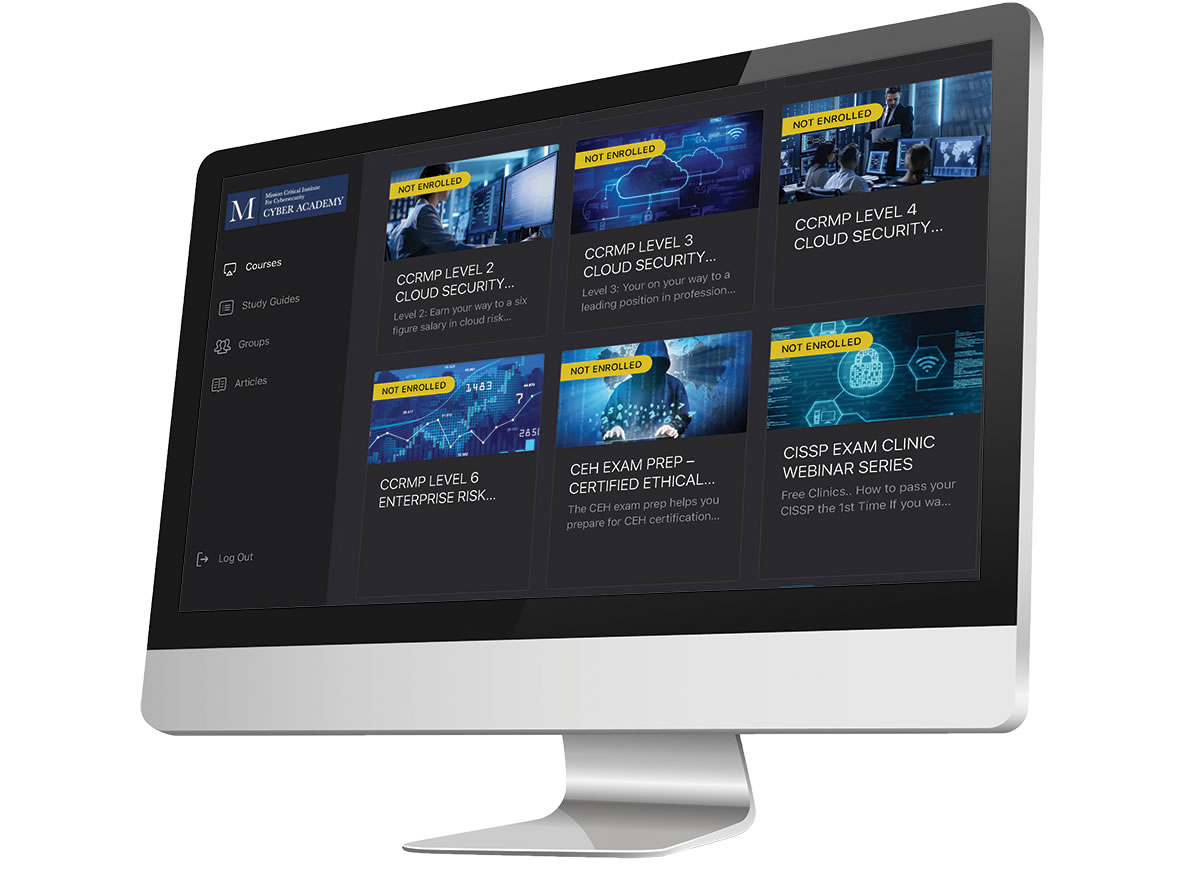
Mission Critical
Filling the Gap in the Cybersecurity Talent Pipeline
through Academic, Corporate, and Economic Development Partnerships

Every company has incorporated technology into their organization’s DNA, and data has become more valuable than oil. The widespread influx in technology usage and recent data breaches has impacted the increased need for cyber support and security and has put cybersecurity at the forefront of daily life; a significant concern for any organization that has a digital footprint.
However, the issue many industry members face is the lack of available experts who have the knowledge and skills to fill cybersecurity positions, to mitigate critical enterprise data risk, and minimize data breaches.
This scenario is what Christopher Etesse stepped into. Etesse, a computer scientist and long-time veteran from the eLearning software industry, was being asked by organizational leaders, especially around the DC metro area, “How can we fulfill the staffing needs within our organizations to mitigate enterprise data risk, when we can’t find the people with the right skills to hire? How do we protect ourselves?”
“These companies kept saying, ‘Can you help us find more people to fill these open positions? As I dug deeper, I began to understand what was happening and discovered this shocking gap,” said Etesse, now CEO, of the Mission Critical Institute.
In 2014, there were more than a million open cybersecurity positions available. In today’s world, there are over 2.5 million open positions in the US alone, and in five years, the industry projects 3.5 million open cybersecurity positions. Internationally, countries like China and Russia are pouring money into cybersecurity, which adds to the United States’ anxiety over the lack of experts within the workforce, creating a virtual arms race for cybersecurity talent.
While the education technology community has had great success in the development of online learning programs in traditional higher education, the supply chain for educating, creating, and developing skilled cybersecurity talent is broken. There simply aren’t enough core academic and certification programs in place to develop the talent required and fill this critical need within the country. In addition, with technology moving so fast, that creating cybersecurity talent requires that practitioners in the workforce teach the next generation of cyber students.
“I started looking at everything in a new way and began identifying where the supply chain was broken and where education processes needed to evolve to fulfill the critical cybersecurity talent required,” said Etesse. “Employer-driven, Department of Homeland Security-recognized, and Practitioner-taught. We believe this is the only way to produce job-ready, cybersecurity employees.”.
Etesse added, “These aren’t your everyday introductory cybersecurity programs. Mission Critical Institute cybersecurity programs are about meeting the critical needs for data defense and enterprise risk management.
Etesse continued, “In many cases, we are up-skilling existing employees with 3 to 5 years of technology experience and turning them into certified cyber risk management warriors.”
In early 2019, the Mission Critical Institute deployed greater efforts around two strategic initiatives to solve the cyber talent development gap.
First, expand delivery partnerships, with top-named universities, to deploy key cybersecurity programs into continuing education, and core academic undergraduate, and graduate programs. Exemplified by relationships most recently with the University of Illinois, Urbana Champaign, and the Critical Infrastructure and Resiliency Institute (CIRI)—funded by the Department of Homeland Security.
Partnering with Academic Institutions
“When you look at colleges and universities, you find they often just teach practical theory, and it takes a long time to get new programs up and running. We’re trying to bridge the gap by bringing capabilities to academic partners, teaching core tactical concepts through practitioners, while providing job-ready hands-on experiences to candidates,” said Etesse, “We want to fix the supply chain pipeline at scale with our partners to produce highly capable certified cybersecurity experts.”
The Institute has deployed several programs for education delivery partners, each one branded as the college’s own program, but powered by the Mission Critical Institute. The Institute’s team works in tandem with the school to recruit students for the university-branded boot camps and provides the curriculum, content, and an integrated virtual learning platform. Mission Critical Institute certified experts and practitioners then serve as instructors, TA’s, mentors, and career counselors to teach and then place the candidates in open cybersecurity positions.
The need for more help is obvious, which is why the Mission Critical Institute continues to build boot camp and certification programs at major universities. The Institute has also been talking with Edge, to launch similar programs throughout New Jersey’s community colleges and universities.
Working with Hiring Partners
The second Mission Critical Institute initiative launched in 2019 is to engage with key employers and hiring partners to gather program feedback and place the candidates they are educating and upskilling.
Ned Novak, Director of Strategy at the Mission Critical Institute, said, “We need to keep pace in the field, and everything from credit card companies to the John Deere tractor company, is becoming a data company with cybersecurity needs. There need to be experts who can secure and protect data, while managing enterprise risk, at every company.”
The goal of the Mission Critical Institute is to create job-ready individuals for businesses, organizations, and institutions. Organizations want to hire cybersecurity personnel they can trust to do the actual work, from entry level networks to advanced risk management.
“These companies would say on paper this person looks really good. They have the certification, the degree, and can talk about various threats, but then when the time comes to actually defend the network and protect data, the person they just hired is not as knowledgeable as they expected and can’t do the work,” Novak, said. “This predicament is exactly why producing talent with practical knowledge that can be directly applicable to an organizations’ specific cybersecurity needs is so vital.”

“These companies would say on paper this person looks really good. They have the certification, the degree, and can talk about various threats, but then when the time comes to actually defend the network and protect data, the person they just hired is not as knowledgeable as they expected and can’t do the work. This predicament is exactly why producing talent with practical knowledge that can be directly applicable to an organizations’ specific cybersecurity needs is so vital.”
NED NOVAK
Director of Strategy at the Mission Critical
Etesse agrees and explains “The Mission Critical institute team guides candidates on what they need to know in terms of meeting an employers’ needs.” Etesse added. “The program, curriculum, and teaching methodologies, were designed as a very hands-on practical approach, with many practicums and lab assignments; similar to the old apprenticeship model.”
The Mission Critical Institute is collaborating with various businesses, organizations, and institutions to directly produce and fill open cybersecurity positions; in some cases leveraging corporate tuition assistance programs. The Institute is creating processes to directly align and facilitate program partnerships between cybersecurity academic program partners and corporations that need cybersecurity talent.

Creation of The Mission Critical Institute
In late 2017, a core group of cybersecurity practitioners and academics came together to develop a new cybersecurity certification program, with a focus on enterprise risk management, called the Certified Cybersecurity Cloud Risk Management Professional (CCRMP). The CCRMP provides a direct cybersecurity career pathway aligned to industry-needed capabilities, beginning with an Intro to Hacking course, all the way up to a Chief Information Security Officer (CISO) level. Mission Critical Institute programs continue to expand to provide capabilities directly aligned to growing cybersecurity industry needs.
Since launching its initial 10-, 24-, and 48-week cybersecurity boot camp programs, the Mission Critical Institute, through graduate, undergraduate, and certificate program partners, has graduated well over 100 cybersecurity candidates and gained a 93 percent placement rate after completion, with students stepping into six-figure jobs. Mission Critical Institute program students have gone on to obtain positions at Northrup Grumman, Lockheed Martin, Booz Allen Hamilton, the National Security Agency, U.S. Dept. of Homeland Security, Microsoft, Deloitte, and many others.
Incorporating New Technology to Bridge the Gap
Key to the Institute’s program success is a recently deployed and unique learning platform assembled from the ground up by veteran e-learning experts and built specifically for the Mission Critical Institute. The learning platform focuses on providing candidates with real world experiences in protecting data and defending networks. An integrated environment allows students to engage real-time, any time of day with hundreds of hands-on activities and virtual labs and strategically scheduled sessions for live collaborative classroom engagement; multiple times a week.
When attending a cybersecurity boot camp program, courses and curriculum address specific segments of cybersecurity, including industry leading tools, technology and techniques, policies, procedures, and critical risk management frameworks developed by the U.S. Department of Defense.
“Once a student has gone through the live lessons and understands the core concepts, they have access to a personalized cyber range, and virtual labs, where everything can be put into practice.” Novak said. “At this point, students have already experienced hundreds of various knowledge assessments and hands-on activities, so once they actually put fingers to the keyboard, protect a network and data, and manage enterprise risk, they are fully prepared and certified. Our student experience provides the full scope of what’s available in the working world.”
“With combined content, technology, and newly added veteran cybersecurity and eLearning industry expertise, our team can produce certified job-ready cybersecurity individual in 22 to 42 weeks,” said Etesse, “An individual that can make a real difference to an organizations ability to mitigate risk at multiple levels.”
Competitive Challenges for the K-12 Arena
With a core mission of filling the cyber talent development gap, the core efforts and programs of the Mission Critical Institute are focused on K-12. With unique virtual cyber competitions, multiple students from across a large geographic region can compete against each other in capture the flag exercises to gain an educational introduction to cybersecurity.
“I think the biggest thing with the K-12 competitions is we are able to identify those superstars who just have a knack for the world of cyber,” Etesse said. “These individuals have ingrained skills and capabilities and we want to capitalize on this interest; planting a seed for the possibilities of a positive career in this burgeoning field.”
The Mission Critical Institute Supports the Needs of Research Institutions
Besides creating interest at a young age, the Mission Critical Institute uses their programs to seamlessly support the needs and functions of research institutions, especially regarding experimentation, research, testing, and virtual labs.
The Mission Critical Institute is partnering with one research institution based out of North Carolina. This research institutions’ program is responsible for training and setting standards for operating controls of water treatment plants, sewage treatment plants, and nuclear power plants.
“This research institution is training and teaching the very people who are going to be protecting and defending those places,” Novak said. “The Mission Critical Institute is helping the school deploy programs and technology for cybersecurity education; opening the door for countless other students to enroll.”
“We want to impact the cyber talent pipeline and support the growing needs of organizations in mitigating risk and protecting themselves,” said Etesse. “The country will remain very vulnerable if we don’t make these changes. There will need to be a concentrated effort from the whole nation to understand and recognize the need for cybersecurity experts. Effort is required from companies like Edge, Fortune 500 companies, and the government. Then we need to formulate goals and strategies on how we’re going to tackle this problem, because the issues are only going to grow and get bigger.”

“Partnering with Edge is a big game changer. Especially when Mission Critical Institute programs, spun up with academic and corporate partners in this area, start creating certified cybersecurity experts and then placing them in jobs.”
Christopher ETESSE
CEO of Mission Critical
Strategic Partnership with Edge
The Mission Critical Institute has become a strategic partner with Edge. The two organizations are jointly pursuing academic institution delivery partnerships with colleges and universities within Edge regions. The combined Edge and Mission Critical Institute team recently met with Brookdale Community College, Mercer Community College, and Georgian Court University, as well as some of the smaller schools around the area. Some of these institutions already have cybersecurity programs, while others want to engage the Mission Critical Institute as an academic program delivery partner.
“Partnering with Edge is a big game changer,” Etesse said. “Especially when Mission Critical Institute programs, spun up with academic and corporate partners in this area, start creating certified cybersecurity experts and then placing them in jobs. This activity could transform economic development and could bring significant change in New Jersey, New York, and even down into Philly, impacting every Fortune 500, Fortune 1,000, and Fortune 5,000 company who has a presence in the region.” He added, “Fixing the lack of qualified experts is what we want to accomplish across the nation, and in partnership with Edge, we are developing the next generation of cyber individuals to help companies further expand and protect themselves, while growing the economy in the New Jersey and New York area. We are tackling the problem head on and changing the landscape.”
For interest in the Mission Critical Institute, visit missioncriticalinstitute.org. Or contact us at edge@missioncriticalinstitute.org
The Institute is actively engaged in pursuing relationships with academic delivery partners who want to increase their student base to meet the talent development needs of the cybersecurity industry, companies and organizations looking to hire cybersecurity staff, and economic development organizations looking to support cybersecurity efforts within their region.

